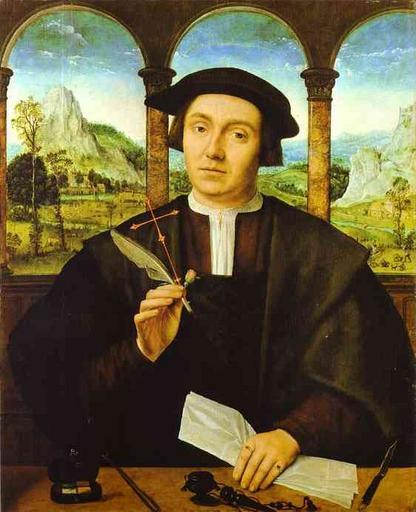MAKE A MEME
View Large Image

| View Original: | Probably_Sir_Thomas_More.jpg (562x692) | |||
| Download: | Original | Medium | Small | Thumb |
| Courtesy of: | www.flickr.com | More Like This | ||
| Keywords: Sir Thomas More (7 February 1478 – 6 July 1535), also known as Saint Thomas More, was an English lawyer, scholar]], author, and statesman. During his life he gained a reputation as a leading Renaissance humanist, a violent opponent of the Reformation of Martin Luther, and a government official. For the last six years of his life he was Lord Chancellor. More coined the word "utopia" - a name he gave to the ideal, imaginary island nation whose political system he described in Utopia, published in 1516. An important counsellor to Henry VIII of England, he was imprisoned and executed by beheading in 1535 after he had fallen out of favor with the king over his refusal to sign the Act of Supremacy 1534, which declared the King the Supreme Head of the Church of England, effecting a final split with the Catholic Church in Rome. In 1935, four hundred years after More's death, Pope Pius XI canonized him in the Roman Catholic Church. More was declared patron saint of politicians and statesmen by Pope John Paul II in 2000. In 1969, More's name was included in the General Roman Calendar, with a memorial in which he is venerated with John Fisher on 22 June, the day of the latter's death. In 1980, More was added to the Church of England's calendar of saints, again jointly with John Fisher, but on July 6, the day of More's death. Sir Thomas More (7 February 1478 – 6 July 1535), also known as Saint Thomas More, was an English lawyer, scholar]], author, and statesman. During his life he gained a reputation as a leading Renaissance humanist, a violent opponent of the Reformation of Martin Luther, and a government official. For the last six years of his life he was Lord Chancellor. More coined the word "utopia" - a name he gave to the ideal, imaginary island nation whose political system he described in Utopia, published in 1516. An important counsellor to Henry VIII of England, he was imprisoned and executed by beheading in 1535 after he had fallen out of favor with the king over his refusal to sign the Act of Supremacy 1534, which declared the King the Supreme Head of the Church of England, effecting a final split with the Catholic Church in Rome. In 1935, four hundred years after More's death, Pope Pius XI canonized him in the Roman Catholic Church. More was declared patron saint of politicians and statesmen by Pope John Paul II in 2000. In 1969, More's name was included in the General Roman Calendar, with a memorial in which he is venerated with John Fisher on 22 June, the day of the latter's death. In 1980, More was added to the Church of England's calendar of saints, again jointly with John Fisher, but on July 6, the day of More's death. | ||||